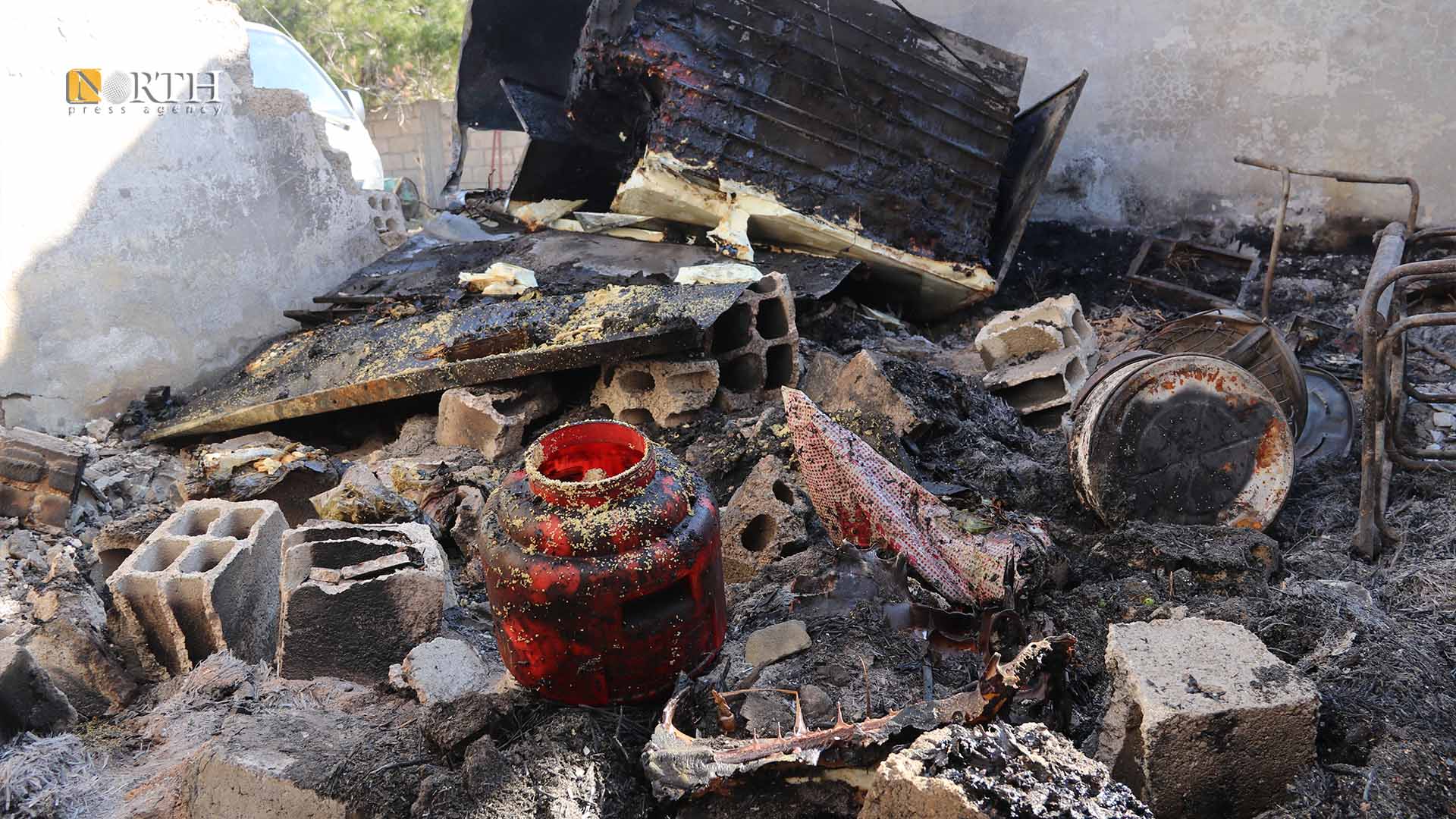DERIK, Syria (North Press) – The 60-year-old Hussein Ali, a resident of Aın Diwar village in Derik countryside, far northeast Syria, gazes into the site of his warehouse where he stored 15 tons of wheat and barley. Now, the it has turned to ashes.
Checking his house whose roof collapsed in the Turkish bombardment last week, he finds the walls covered in black and everything inside has been burned. Every single piece of its properties has been damaged.
The Turkish bombardment on the village has demolished his house completely.
Ali estimates material losses at 100 million Syrian pounds ( SYP more than $27,000). His house and the warehouse were completely burned.
“Industrial tools, medicine for animals, the furniture, kitchen utensils and my children’s university books all have burned,” Ali said counting his losses.
Then he went on saying “everything was set on fire. Everything was turned to ashes. I don’t know what to say?”
The Turkish shelling last Wednesday left huge material looses to people’s properties, wounded two persons, demolished two houses, set fire in five others and caused mass displacemnt.
On the same day, the Turkish forces fired two shells on the countryside of Derik, but the shells did not explode.
The Turkish forces also shelled Gire Fara village in Derik countryside causing material damge.
The day before, the Turksih forces shelled the fourth power station near Teql Beql, 30 km southeast Derik, damaging the station partially, wounding two persons of the power station employees and causing power outage.
Russian/American patrols
People of Ain Diwar demand the Russian and US forces in the area protect them from the recurrent Turkish shelling that usually damages properties and causes public dismay.
On Monday, a US patrol drove to Ain Diwar to check the aftermath of the shelling.
Troops of the US patrol, which consisted of four military armoured vehicles, visited the destroyed civilians’ houses, took photos and collected sharpnels.
They also asked the residents about the direction from which the Turkish shelling is launched indiscrimintaly targeting their roperties.
Villagers told the US patrol that it is now the season to cultivate and seed their agricultural lands situated on the Syria-Turkey border and spray fertilizers but they fear the Turkish shelling.
The villagers asked the US patrol to be present permanently in the area near the border to spare the village a future Turkish bombardment.
On the same day, a Russian patrol visited the same village but did not check the scenes.
Two days earlier, a Russian patrol, comprising three military trucks, visited Ain Diwar and members of the patrol spoke to the villagers about the direction where the Turksih shelling is launched from.
The Russian Military Police (MP) and the US forces conduct periodic patrols in Derik countryside without clarifying details on the importance or objectives of the patrols.
The people wander about the use of such patrols since they do not stop Turkish shelling.
With what right they bombard us?
Ramadan Khalil, co-chair of the Ain Diwar-based Matryr Zinar Commune, beleivs that the US patrols should protect the region against the Turksih shelling.
Like other villagers, Khalil said the US troops hold responsibility to protect his village and other villages adjacent to the Turksih border.
People need guarantees that Turkish shelling will not occure again so that they can cultivate their lands and live in peace, Khalil said.
The 55-year-old Wajiha Temmo, a woman living in Ain Diwar, complains about the repeated Turkish shelling despite Russian and US forces as well as NGOs are present in the area.
“They do not ask about the reason that we are being displaced, and why our houses have been burnt,” she said in anger.
“Every time we flee to Derik for fear of the shelling,” she added.
The Turkish forces targeted not only Derik countryside, but also some villages in Manbij countryside and the villages of al-Asadya, Dada Abdal, and Rabi’at in Zargan (Abu Rasin) district, in addition to some villages in Tel Abyad and Ain Issa.
Some villagers are compelled to flee their homes in the evening and come back in the morning fearful of any possible shelling that might occur at night as they along with their families will be stranded.
Sitting at a chair in front of her house, the 67-year-old Hadya Youssef, said “May God takes revenge on him,” in a reference to the Turkish president Recap Tayeb Erdogan.
“With what right do they shell our land? This is our homeland.”
“Since we do not cause them harm, why they hurt us. We will not leave our homeland for the rest of our life,” she noted.

